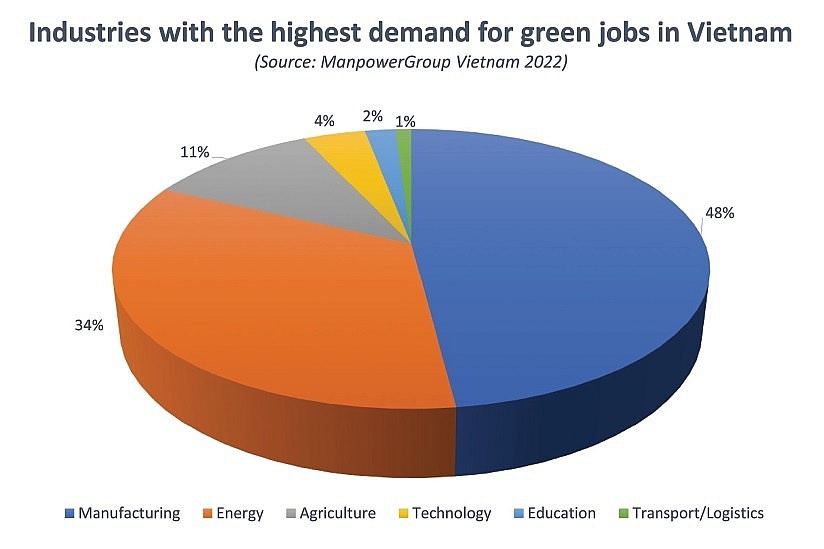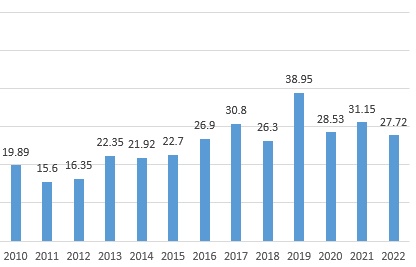Green transition placing pressure on labour market
Despite a clearer direction since net-zero vows were made in 2021, Vietnam will continue to face challenges stemming from human resources that do not meet the requirements of such a transition.
 |
| Green transition placing pressure on labour market, illustration photo/ Source: freepik.com |
“At this moment, the demand for green skills is outpacing its availability. Around 60 per cent of young people may lack the necessary skills to thrive in the green economy by 2030,” United Nations Resident Coordinator in Vietnam, Pauline Tamesis, told a green skills education workshop earlier in August.
Nguyen Ngoc Duyen, a national skills development project coordinator at the International Labour Organization, said that the share of job postings requiring a worker to have at least one green skill jumped 22 per cent from 2022 to 2023. In addition to areas including renewable energy, environmental protection, logistics, and green jobs are also present in all traditional industries.
“A green job is not only a production process that meets environmental protection standards. It is also a satisfactory job when employees have good income and higher working productivity, as defined by the ILO,” she said.
The ILO estimates that there will be about 7 million jobs lost and 25 million new ones created from the green transition globally by 2030. Asia-Pacific is the region that stands to benefits the most.
The transformation of the employment system has posed the challenge of developing skills to meet new job requirements, especially training for workers in occupations that are at risk of disappearing due to the green transition.
“Around 14 million new jobs will be created if regional countries continue to invest in the environment, and Vietnam is no exception,” Duyen shared. “Changing job opportunities require young workers to prepare basic knowledge and learn skills involving efficient use of resources, engineering, operation, supervision, and soft skills. These are the necessary preparations to meet the new requirements of the economy.”
The results conducted by the World Bank in collaboration with the General Statistics Office show that green jobs account for nearly 4 per cent of total jobs in Vietnam and are present in nearly 40 occupations. However, 90 other occupations that currently hold more than 40 per cent of total employment have great potential to become green occupations in the future.
 |
“Each sector has green jobs, even though they do not directly provide environmental goods and services. For example, environmental engineers and conservationists are green careers in the mining industry, while agriculture has the highest concentration of potential green jobs,” cited Abla Safir, senior economist at the World Bank.
According to the World Bank, Vietnam’s green employment rate is equivalent to that of the United States, Indonesia, and Cambodia. This rate will also increase as investment trends for the environment and sustainable development are top priorities in many countries, leading to an increase in the demand for labour in respective fields.
According to Deloitte’s 2023 CxO Sustainable Development Report, three-quarters of businesses globally have increased their investment in sustainability over the last year. Studies reveal that about 70 per cent of employees feel that a sustainability initiative makes an employer more appealing.
“Recruitment adverts mentioning businesses’ environmental, social, and governance efforts often draw in a larger number of candidates, especially young ones,” Nguyen Thanh Huong, country human resources manager at Manpower Group Vietnam shared.
ManpowerGroup is currently assisting many businesses to find candidates for hundreds of green job positions, including full-time work and labour outsourcing. The company says manufacturing, energy, agriculture, and technology industries have the highest demand for green personnel.
Agricultural enterprise GREENFEED Vietnam has also complained about the lack of qualified workers.
Chief people officer Nguyen Tam Trang said, “The company seeks as many as 2,000 employees in addition to the 4,000 currently working at member companies of the group. However, it is not always possible to recruit enough personnel to meet such needs.”
To be proactive in human resources for greening, the company has cooperated with more than 40 universities and colleges to implement programmes to award scholarships, sponsor scientific research activities, and create internship opportunities for more than 400 interns each year. The enterprise also organises factory tours, soft skills training, and sharing sessions between its leaders and students.
As of the first quarter of 2023, nearly one-fifth of graduates from the Grow Talents joint training programme, launched by the company in 2020, have become full-time employees at the group’s business units.
“We also implemented an in-house training system to develop global competencies for all positions. Last year, the group conducted over 86,000 hours of employee training,” Trang said.
Le Thi Nhu Hang, business manager at Navigos Search for South Vietnam, said that the demand for human resources in agriculture, forestry, and fisheries is increasing, and most enterprises said that there is a serious shortage of highly qualified people.
She advised that businesses need to have good remuneration policies for employees in terms of income, working environment, and a transparent promotion roadmap to attract stronger workers.
“Agricultural enterprises also need to focus on recruiting highly qualified, professional, and passionate personnel and understanding the nature of the industry to build resources for modern and sustainable development,” she added.
| Pauline Tamesis - Resident coordinator United Nations in Vietnam
Green skills are the practical tools and knowledge that allow us to harness the power of eco-friendly technologies and to make environmentally conscious decisions in both our professional and personal lives. As the world embarks on a journey towards a more sustainable future, these green skills become the compass guiding us through the uncharted waters of a rapidly changing world. Currently, the demand for green skills is outpacing its availability. We must address this disparity and ensure that everyone, regardless of their background or gender, has equal access to these skills. In Vietnam, we are blessed with a vast pool of young talent, comprising 22.1 million individuals aged between 16 and 30. This incredible potential must not go untapped. By investing in quality education and fostering a supportive environment for youth engagement, we can equip our young generation to play a leading role in driving a just, equitable, and sustainable future for Vietnam. Tran Hong Van - Communications specialist Vietnam Initiative for Energy Transition
The topic of green jobs and skills was raised this year at a time when Vietnam’s economy is strongly moving towards being green and sustainable. Howerver, this concept for young workers is quite new. To realise the net-zero commitments by 2050, Vietnam needs to come up with a sustainable roadmap for human resources and green jobs with practical action, not a trend. With the green economy, there are many job opportunities that will focus on areas such as renewable energy. For every job lost in the traditional energy industry, four new jobs are created in the green energy industry. This is an opportunity for young workers to enter a career development roadmap. Through our research, we see that the industry and green energy in the next 5-10 years will create a lot of new job opportunities. We have launched the Greenjob app to access basic knowledge about the energy transition, connect candidates’ profiles with experts, and advise them on suitable training and employment programmes. |
 | Changes in labour market since Vietnam's Law on Foreign Investment The official passage of the Law on Foreign Investment in Vietnam in 1987 is considered a historic turning point that contributed to attracting an increasing number of foreign-led enterprises to the nation. Nguyen Xuan Son, operations manager for Staffing and Outsourcing Services at ManpowerGroup Vietnam, discusses the law’s effect on the labour market and employees in Vietnam, as well as the expected trends for the next few years. |
 | The impressive changes in Vietnamese labour market The official passage of the Law on Foreign Investment in Vietnam in 1987 is considered a historic turning point that contributes to attracting an increasing number of foreign-led enterprises into Vietnam over the years. Multinational corporations opening new branches as well as newly established foreign-backed enterprises in many fields create great demand for domestic labour, generating jobs and improving livelihoods and quality of life for Vietnamese people. |
 | Positive signs from overseas labour market The number of Vietnamese guest workers working overseas under contracts exceeded 59,600 in the first five months of this year, or 54.2 per cent of the annual plan and over 1.9 times higher than the same period last year, showing positive signals from overseas employment, according to the Department of Overseas Labour under the Ministry of Labour, Invalids and Social Affairs. |
What the stars mean:
★ Poor ★ ★ Promising ★★★ Good ★★★★ Very good ★★★★★ Exceptional
Related Contents
Latest News
More News
- Vietnam sets ambitious dairy growth targets (February 24, 2026 | 18:00)
- Masan Consumer names new deputy CEO to drive foods and beverages growth (February 23, 2026 | 20:52)
- Myriad risks ahead, but ones Vietnam can confront (February 20, 2026 | 15:02)
- Vietnam making the leap into AI and semiconductors (February 20, 2026 | 09:37)
- Funding must be activated for semiconductor success (February 20, 2026 | 09:20)
- Resilience as new benchmark for smarter infrastructure (February 19, 2026 | 20:35)
- A golden time to shine within ASEAN (February 19, 2026 | 20:22)
- Vietnam’s pivotal year for advancing sustainability (February 19, 2026 | 08:44)
- Strengthening the core role of industry and trade (February 19, 2026 | 08:35)
- Future orientations for healthcare improvements (February 19, 2026 | 08:29)



 Tag:
Tag:


















 Mobile Version
Mobile Version